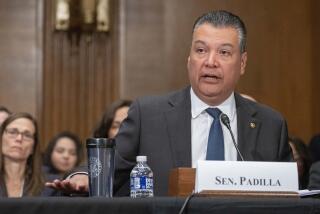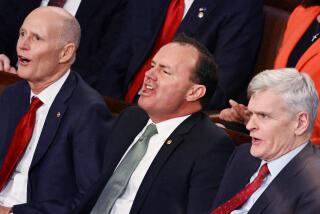Two Democrats Back GOP Health Plan : Congress: Sens. Kerrey and Boren say move is needed to prevent gridlock on reform. They say they still support Clinton’s goal of universal coverage.
- Share via
WASHINGTON — Two Democratic senators Wednesday announced their support for a Republican health care reform plan that seeks to achieve universal coverage by forcing all individuals to buy insurance while freeing employers from that responsibility.
Sens. Bob Kerrey of Nebraska and David L. Boren of Oklahoma said they are backing the GOP bill--whose sponsors include Senate Minority Leader Bob Dole (R-Kan.)--in hopes of breaking what they see as partisan gridlock-in-the-making over health care reform.
They insisted that their action should not be regarded as a snub of President Clinton, saying they share his goal of universal coverage.
“My action today should not be viewed as any opposition to the President’s goals, but as the best way to move them forward,” Boren said. He and Kerrey said they were motivated by a belief that none of the committees in either the House or the Senate appears likely to produce a bill with a realistic chance of congressional enactment.
“Today we are crossing the line and saying that we will not allow the rivalries and political games that too often dominate this process to get in the way of the health care that Americans need,” Kerrey said.
Boren added: “If we do not form a bipartisan consensus soon and we don’t begin to work on a bipartisan basis within the Senate Finance Committee, we will lose health care reform.”
Their endorsement of the Republican plan stunned congressional observers and health care analysts, but many said the senators’ action could have the intended effect.
“This is the most significant breakthrough all year in moving the Congress toward action,” said Bill Gradison, the head of the Health Insurance Assn. of America. “There’s been very little true compromise and not much bipartisanship so far.”
The only Republican senator to support Clinton’s plan is James M. Jeffords of Vermont.
While a half a dozen or more congressional panels are struggling to develop health care legislation, much of the attention is riveted on the critical Senate Finance Committee, where the 11 Democrats and nine Republicans are said to be “entrenched” in conflicting positions, in the words of one member.
The committee is a bellwether panel because both Dole and Senate Majority Leader George J. Mitchell (D-Me.) are members, as are Boren and John H. Chafee (R-R.I.), author of the plan that Boren and Kerrey endorsed. In addition, Kerrey has long had close ties to committee Chairman Daniel Patrick Moynihan (D-N.Y.).
Gradison said: “That committee is where many of us have been looking for signals that a bipartisan approach might happen. And if it can happen there, it can happen in other places.”
The White House also viewed the development with some optimism. “What Kerrey and Boren said today is, they are committed to enacting legislation that provides universal coverage,” said spokeswoman Lorrie McHugh.
Boren and Kerrey took pains to note that they were not offering an unqualified endorsement of Chafee’s plan, saying they may seek major changes, such as adding some form of an employer mandate.
A mandate for individuals, as proposed by the Chafee plan, has numerous skeptics, most notably the President and First Lady Hillary Rodham Clinton, who headed the Administration’s health care reform task force.
They have repeatedly criticized that approach as one that would be nearly impossible to enforce and would require the Internal Revenue Service to “engage in an enormous administrative oversight of our health care system,” in the words of Hillary Clinton.
She and the President also have said that an individual mandate would encourage businesses to stop covering workers. In a speech earlier this year, the First Lady said: “Wouldn’t employers, looking at this rationally, say to themselves: ‘If I am currently paying benefits for this population group and now the government will subsidize them, I will drop them?’ ”
Chafee’s plan, whose chief House sponsor is Rep. Bill Thomas (R-Bakersfield), would require employers to offer workers insurance but not to pay for it. It would also provide government subsidies to workers with low incomes.
The Clinton plan would require all businesses to pay at least 80% of a worker’s insurance premiums, with the employee paying the rest. But no firm would have to pay more than 7.9% of payroll, while some small businesses would pay as little as 3.5% of payroll. There would also be subsidies for small businesses with low-wage earners.
Chafee’s bill would allow for the creation of voluntary, consumer-based insurance-buying cooperatives, whereas Clinton would force all businesses with more than 5,000 employees to join such “alliances.”
More to Read
Get the L.A. Times Politics newsletter
Deeply reported insights into legislation, politics and policy from Sacramento, Washington and beyond. In your inbox twice per week.
You may occasionally receive promotional content from the Los Angeles Times.










